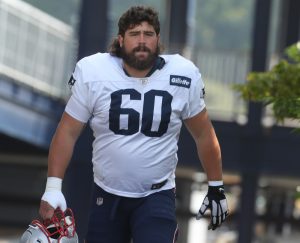
Minnesota Supreme Court orders new trial in Iron Range woman’s 1986 homicide
The Minnesota Supreme Court on Wednesday ordered a new trial for the man convicted of raping and killing an Iron Range woman nearly 40 years ago.
Michael Allan Carbo Jr., 56, has been serving a life sentence after a Hibbing jury in August 2022 found him guilty of two counts of first-degree murder in the 1986 slaying of Nancy Daugherty, a 38-year-old Chisholm mother of two.
Michael Allan Carbo
Carbo was first connected to the case in 2020 by DNA evidence, but he denied responsibility for her killing.
He sought, but was not allowed, to argue at trial that another man, Brian Evenson, was the true perpetrator — a ruling that a majority of the court found to be erroneous.
“We cannot say beyond a reasonable doubt that a reasonable jury would have reached the same verdict,” Justice Barry Anderson wrote, saying the exclusion of the evidence was “not harmless.”
The reversal does not exonerate Carbo, but it sets him up for a new trial in which he may be able to introduce evidence and argument that the defense considered critical to the case.
Evenson, a friend and one-time lover of Daugherty, was the last known person to see her alive and was a key witness at the trial. Visiting from out of town when she was killed, he was also joined by police officers in discovering her body the next morning.
“We are pleased that the Supreme Court ordered a new trial,” said public defender J.D. Schmid, who represented Carbo at trial. “It is still very hard to say that justice is being served when Mr. Carbo has been locked up for almost four years for a crime he did not commit.
“Based on the ruling, we hope that the County Attorney’s Office will take a much closer look at the evidence showing that someone else killed Nancy Dougherty and decide for themselves that it is not just to continue to prosecute Mr. Carbo. We also hope that the district court will have the humility to recognize its error and give Mr. Carbo a full presumption of innocence if we have another trial.”
Deputy St. Louis County Attorney Jon Holets, who helped prosecute the case, said his office was “disappointed” in the decision.
“We remain committed to prosecuting Mr. Carbo for the murder of Ms. Daugherty based on the facts establishing his guilt as outlined in the complaint,” Holets said. “We cannot comment further on a pending case. We ask that the requests for privacy of Ms. Daugherty’s family be respected.”
Defense cited Evenson’s letters, hair
Daugherty was found dead in her bed July 16, 1986, apparently having been sexually assaulted and strangled to death.
Authorities obtained DNA from semen as well as scrapings under the victim’s fingernails, but testing of more than 100 possible suspects failed to turn up any matches in the ensuing years.
It was only in 2020 that the Chisholm Police Department contracted with a private company, Parabon NanoLabs, to conduct a genetic investigation. Using samples maintained by private databases, the company identified Carbo as a possible suspect for the first time.
Carbo was 18 at the time of Daugherty’s death and lived about a mile away, attending school with her children. The Minnesota Bureau of Criminal Apprehension obtained DNA samples from Carbo’s garbage and him directly, concluding he was a match for the crime scene evidence.
The defense did not dispute that Carbo had sex with Daugherty on the night of her murder, but they claimed he was blackout drunk and had no memory of it, leaving before the killer arrived.
Undated courtesy photo of Nancy Daugherty. (Forum News Service)
Evenson testified that he had spent time that night with Daugherty, a friend he had volunteered with on the local ambulance service. He said he last saw her around midnight and planned to help her move the next morning to the Twin Cities, where she would attend school for a paramedic career.
The defense, however, aimed to argue that Evenson committed the killing out of jealousy. Attorneys cited evidence that he had written Daugherty numerous letters, including one in which he said: “There are times that I think about you that I get so mad I could wring your neck.”
Evenson, according to the defense, also acknowledged having a temper and stated in a 1998 interview with law enforcement: “I’ve often wondered, ‘Jeez, did I wake up in the middle of the night, drive over here and kill her, go back to bed and not know it?’ ”
His hair was also found in Daugherty’s bedroom and a neighbor saw a vehicle in the victim’s driveway that may have matched Evenson’s, according to the defense motion.
But Judge Robert Friday would not allow the alternative-perpetrator theory. He called it “mere speculation and bare suspicion” and affirmed that decision when he denied a new trial after the conviction.
Court divided on alternative suspect
The Supreme Court was divided in its analysis, but four of seven justices said Carbo was entitled to a new trial due to the error.
Anderson, writing for the majority in the 57-page opinion, noted Evenson was the case’s lead suspect from the early days of the investigation.
There was never sufficient evidence to arrest or charge him, the justice noted, but he reasonably fell under suspicion due to a number of factors.
“It does not require a ‘significant speculative leap’ to take one look at the facts here and conclude that those facts had an inherent tendency to connect (Evenson) to the actual commission of the crime,” Anderson wrote. “If the alternative-perpetrator evidence here is not sufficient … it is reasonable to ask whether any alternative-perpetrator evidence is ever admissible” under established precedent.
Justice Anne McKeig dissented, saying Daugherty’s house wasn’t a “crime scene” until after Evenson left and that his allegedly threatening remarks were taken out of context.
Joined by Justice Gordon Moore, she said the decision breaks down “safeguards” built into the analysis for alternative perpetrator defenses.
“Now district courts will be forced to make speculative inferences and consider evidence that has no inherent tendency to connect a third party to the actual commission of a crime,” McKeig wrote.
Justice Margaret Chutich agreed with the majority that Carbo should have been allowed to present the defense. But she sided with McKeig and Gordon in holding that a new trial was not warranted because the “strength of evidence” against Carbo would have resulted in a conviction regardless.
DNA profile not a privacy violation
The court separately ruled that authorities did not violate Carbo’s rights by analyzing DNA evidence he “abandoned” at the crime scene or by obtaining a sample from his discarded garbage without a warrant.
“By Carbo’s own account, he got so drunk that he blacked out, had unprotected sex with Daugherty in her yard, then cleaned up in her bathroom and left,” Anderson wrote. “These actions do not lead to an inference that Carbo intended to keep his genetic information — which he knew his semen contained — private.”
Therefore, the majority wrote, there was no violation when authorities sent a sample to Parabon for analysis.
Likewise, the court ruled, Carbo voluntarily provided a DNA sample to investigators when approached in 2020 — unaware that his garbage had already been tested and that he was under investigation for the killing.
The case was believed to be the first of its kind in Minnesota to be built through genetic genealogy — using methods similar to the high-profile investigation that caught the “Golden State Killer” in California.
But the use of decades-old DNA to stitch together family trees and identify potential suspects hasn’t been without controversy from privacy advocates. The American Civil Liberties Union of Minnesota filed an amicus brief in Carbo’s favor on the issue.
Justices Karl Procaccini and Paul Thissen wrote that a warrant should have been required to develop a profile from the DNA left at the crime scene. Only Thissen, though, said he would have suppressed the evidence, as Procaccini cited a “good-faith exception” to allow it.
Carbo is incarcerated at the Minnesota Correctional Facility in Rush City and is likely to remain in custody under pretrial conditions. The case will be sent back to Judge Friday for further trial court proceedings in Hibbing.
Related Articles
Stormy Daniels fends off accusations she made up story of tryst with Trump at hush money trial
Owner of Minneapolis-St. Paul-West St. Paul Mexican restaurants charged with tax crimes
MN Supreme Court denies new trial for man convicted in fatal St. Paul fender-bender shooting
Charges: St. Paul mother asked for Narcan before her baby’s December fentanyl death
Woman charged in deaths of 2 children on Red Lake reservation


